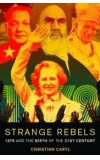
08 Jul 2013 23:35:35
As the Soviet Union unravelled in the 1980s, eastern Europeans returned to the rosary in their thousands. Pravda, the Soviet party daily, condemned sightings of the Madonna in Poland and elsewhere as the work of "wreckers" bent on subverting socialist utopias. (The Ukrainian Mary usually appeared in a glow of orange and blue light – the Ukraine national colours.) The political significance of Marian apparitions was not lost on John Paul II, the Polish-born pope and cold war intransigent who defended spiritual values against the state in the eastern-bloc satellites. To his detractors, John Paul II was a doctrinal conservative out of touch with the exigencies of modern life. Graham Greene, for one, condemned his views on birth control and anti-left animus in general. Asked what he would like to say to John Paul II, Greene replied tetchily: "I think my five minutes with the pope would only lead to excommunication."
In this provocative if highly original account of the year 1979 and its political significance, the pope is hailed as an unlikely "rebel" figure, who helped stage a counter-revolution against moribund ideologies. His ideologue-in-arms, Margaret Thatcher, was another anti-state evangelist who came to power that momentous year. In Christian Caryl's view, 1979 was a pivotal 12 months which diverted the course of history in radical and unforeseen ways.
The author, a former Newsweek correspondent, tells the story of that single year with verve and scholarship. He makes unlikely connections between the Iranian revolution and John Paul II's papacy, the Afghan jihad and the economic reforms pursued by Deng Xiaoping and Thatcher, all of which took root in 1979.
Khomeini, black-robed and scowling, had little in common with China's outwardly jovial premier Deng. Yet the two leaders shared a missionary zeal to instil ideals alternately of religion and the free market. Khomeini seized power in Iran in 1979 following the overthrow of the shah. In Caryl's analysis, Khomeini's arch enemy was fatally beholden to the secular radicalism of Kemal Atatürk, who founded the modern Turkish republic. In his frenzy to modernise Turkey after the first world war, Atatürk destroyed Islamic schools and abolished the veil as a narrowly Asian trapping. For the shah, Atatürk was the greatest nation-builder of modern times; in the 37 years of his authoritarian populism he transformed the Iranian capital of Tehran into a westernised outpost supposedly free of Islam's influence.
Islam's aura of purity and principle, however, had been debased, Khomeini believed. Only the "religio-political faith" of Islam could rid Iran of its pro-American, pro-Israel monarch. The Khomeinist revolt was almost Castro-like in its anti-American fervour, writes Caryl. The Ayatollah's subsequent 10-year theocracy was not the medieval throwback so often portrayed in the west, however. In Khomeinist interpretations, Islam was a levelling creed that scorned monarchy and the west's "corrupting" influence alike.
Thatcher, like Khomeini, thrived on ideological aggression and brooked no dissent. Her election triumph in 1979 was a "watershed moment" for the world that saw the first ever political evangelist installed in No 10. In no time at all, Thatcher became the face of the "market counter-revolution" that swept post-communist Europe hand-in-hand with John Paul II's anti-Soviet exhortations.
For all his erudition, Caryl neglects to mention that Thatcher's privatisation and anti-trade union legislations had been influenced at least in part by General Pinochet's policies in Chile. Pinochet's appeal to British rightwingers in the late 1970s was not so peculiar. Britain under the Labour government of Jim Callaghan was riven by strikes, power cuts and IRA bomb attacks. The once imperial British lion had become a minor power at once bankrupt and played out. Branches of British military intelligence and the secret services clamoured for a strongman such as Pinochet, who might impose order through a monetarist budget and capitalist rigour. In Thatcher they found their answer.
China at this time was still reeling from the effects of the cultural revolution that ended in 1976, when Mao-suited officials humiliated "class traitors" in public with dunce's hats and jeering crowds. Deng, Mao's successor after the Gang of Four's interregnum, instituted a number of self-financing co-operatives and sought to lure in foreign capital. For the first time since the People's Republic was founded in 1949, the Chinese were allowed to make profits at work (but without surrendering too much to capitalist avarice). The world's most populous country had at last taken on Thatcherite values of entrepreneurship.
The forces unloosed in 1979 of free-market capitalism and politicised religion are with us still. Few had expected to live in such an unusual moment; Strange Rebels, superbly written, brings a tumultuous single year to life in all its proper significance.

